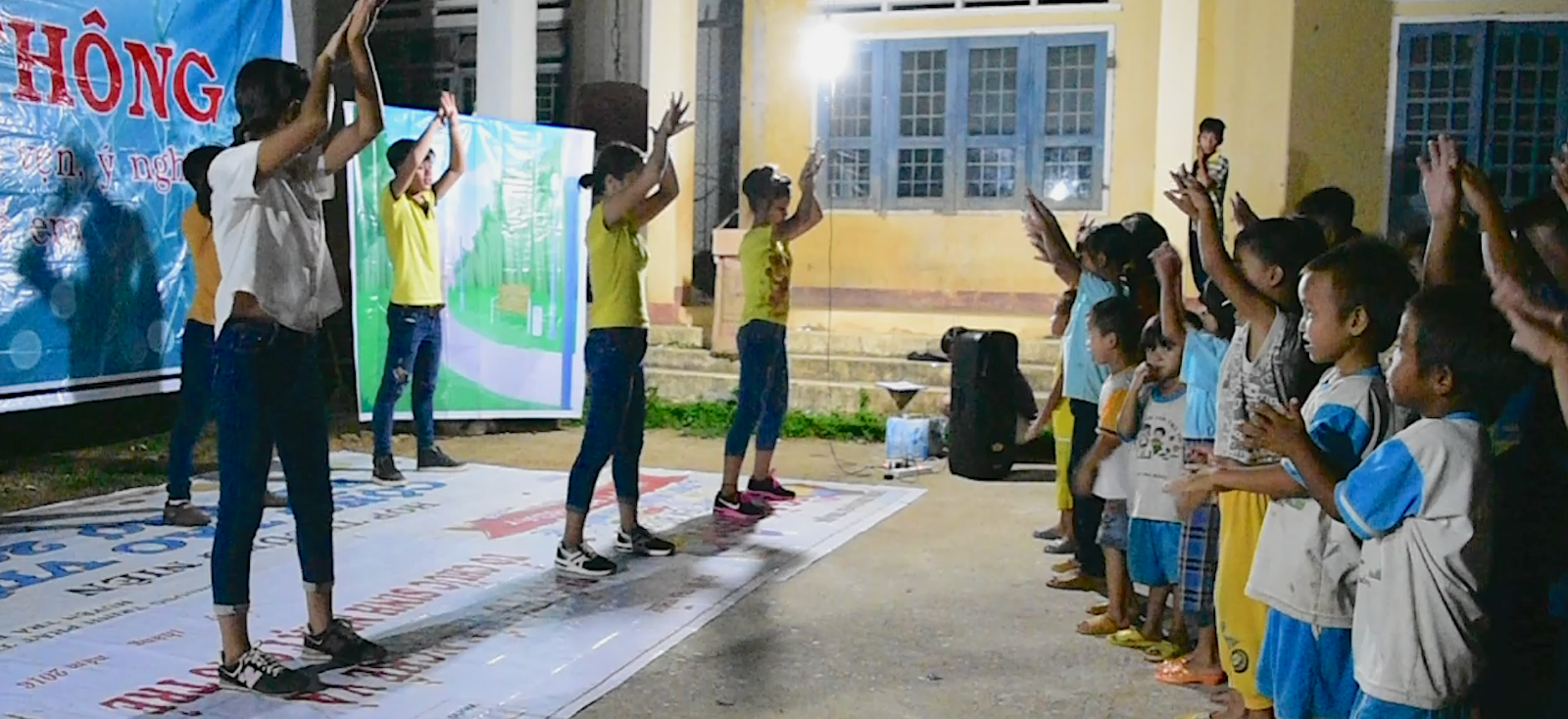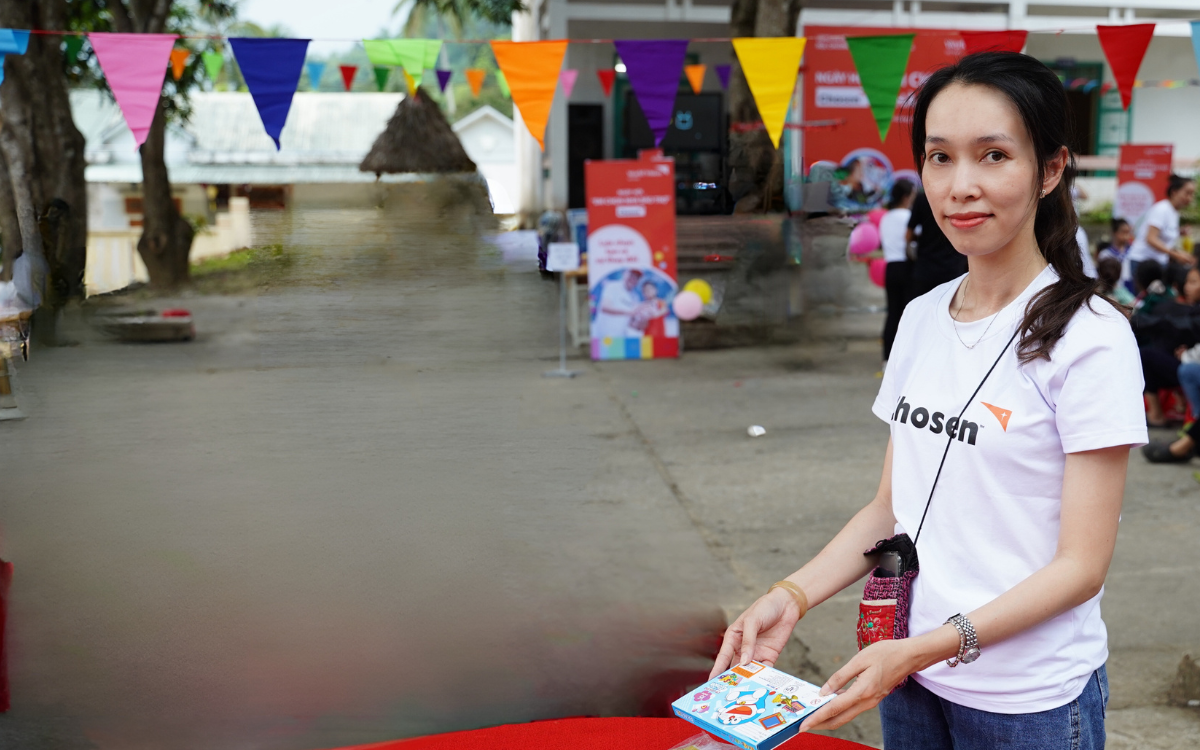On this year's World Humanitarian Day (August 19), World Vision has a conversation with Ms. Nguyen Thi Thuy Trang, a Southern Zonal Sponsorship Officer of World Vision International in Viet Nam. After a 17-year journey with World Vision, she has many gratifying memories of this position, which directly connects with and impacts the lives of children and the community.
World Vision: What was your initial impression of World Vision when you started working at the organisation?
Thuy Trang: As I was seeking for a job after graduating in 2007, I learned that an international non-government organisation, World Vision, was in need of staff to work in the field of community development, specifically the Child Sponsorship Programme, and has their office located right in my hometown (Tra Bong district), so I applied for the position. I started at World Vision as a Child Sponsorship Programme intern. At first, I found the working environment quite strange; because it was completely furnished with office supplies like computers, cameras, and other equipment... Nearly 20 years ago, an office that could equip employees with such working tools was considered exceptionally professional. I even had my own workspace, as at that time, Sponsorship staff worked in a separate room to process documents and store our own working tools. After working as an intern for a while, I was retained to work in an official position, and I felt blessed that my efforts were recognised.
When I told my friends that I work for World Vision, everyone was amazed and cheered for me that I am an employee of such a reputable organisation.

Thuy Trang (in orange shirt) encourages sponsored children to write their unique letters called Child Expression Worksheet and share their life observations with the sponsors.
World Vision: Could you please share more about the nature of your work?
Thuy Trang: Before working at World Vision, I had never heard about the type of work that involved working with children and communities and connecting with sponsors to create resources for community development, like the organisation's model. Having spent 17 years working at World Vision with different works in the Sponsorship Programme, from intern to official staff at the Tra Bong Area Programme and then Southern Zonal Sponsorship Officer, all my work shared that core.
World Vision: Can you share a memorable experience working with World Vision?
Thuy Trang: I have had the opportunity to meet many children in different circumstances and have seen many vulnerable children who need further support. There have been times when I wanted to provide more support, but resources were scare. We collaborated with the local community to locate more resources.
Back in 2014, a Development Facilitator and I in Tra Bong organised an activity with the participation of a group of sponsored children. The childrens' group showed remarkable initiative and creativity by planning events and performing on stage to share the benefits of World Vision's Sponsorship Programme that they were joining. Topics that are regularly communicated to remote villages through art performances including World Vision's Sponsorship Programme, Child Marriage Prevention, Environment Protection, and so on. Communication activities took place in the evening because this was the time when the residents could all participate.
When organising these activities, the children's group only received some material support, but they were enthusiastic and proactive in planning. When we all work with all our hearts, we feel delight.

The children group participates in organising performances in remote villages of Tra Bong district to communicate about the Sponsorship Programme and other Life Skills for children.
Another memory associated with the sponsors was happened in 2019. At the end of the sponsorship years for a child, a sponsor pays a final visit to the child. When the sponsor met their child and talked to him, the scene brought everyone to tears as they saw the sponsor's gentle love for the child. Every sponsor visit was touching and meaningful like that.
It would be wonderful if we could improve communication to help our community comprehend the meaningful connection between children and sponsors worldwide, the sponsors' benevolent intentions towards children, and the crucial role that these resources serve in the growth of our community.
World Vision: What difficulties have you experienced while doing this work?
Thuy Trang: There are always difficulties and challenges in accomplishing the work; at those times, I keep in mind that even with small contributions, I am bringing more hope to children and the community.
I still remember the early days when I worked at the Tra Bong Area Programme, visiting sponsored children, crossing muddy roads, and wading through rivers and streams. The roadways were paved and progressively renovated years later. One of the things I can still clearly recall is riding a motorbike to a remote area with my Area Programme manager; the road was challenging and winding. It was one of our visits to the sponsored children. Due to the nature of the sponsorship work, we need to visit and take pictures of the sponsored children to the sponsors on their life condition at least once a year. That day, I had to get off the motorbike numerous times whenever we climbed up a slope as the motorbike could not bear both of us sitting on it. Then I walked until I got out of breath to get up those slopes. Yet when we arrived at the child's house, the child did not want to meet strangers like us nor let us take her picture. As a result, we empty-handed.
Although it was difficult, the other humanitarian staff and I understood we could not back down, we needed to find different ways to get through the objective.
World Vision: What makes you stick with this humanitarian career over time?
Thuy Trang: I have already had a good impression of World Vision. Later on, although I underwent many changes in my work and personal life, some good things still made me stick with the organisation.
World Vision's working environment makes me feel supported to do my best work. The supervisors are all friendly with the staff; everyone has almost no pressure on the supervisor-employee relationship. If there is pressure, it can only come from responsibility for the work.
The organisation's integrity is also one of the reasons I love this work; it helps me sleep well. Because of the transparent environment, I'm quite happy to work wholeheartedly and release myself the sanctuary of mental comfort.
However, sometimes, when I go to sleep, I still dream about work, the tremendous amount of work that needs to be done. At those times, I lean on my colleagues or take guidance from some courses; pressure is also a motivation.
After giving birth, there was a time when I found it difficult to continue this work because my baby needed a lot of care. While the nature of the work required me to travel abundantly, I could only visit home on weekends. At that time, I presented my situation to my supervisor and arranged for a home-based work mode. I felt that the organisation has always been attentive and supported me.
World Vision: Can you share more about how supervisors and organisations support employees?
Thuy Trang: Fortunately, I have worked with different supervisors. What they have in common is their understanding and support for employees. They also empower and challenge me in my work.
Managers have a broad vision; each has a very different management style to help the whole team achieve common goals at work. Each team player also understands their role and is autonomous in their work; any activities that need support from supervisors and colleagues should be brought up. For example, if there are activities in the District Programme I am implementing for the first time, I still need to gain experience in carrying out those activities. In contrast, others have already handled other Area Programmes so that we can learn from one another. Supervisors always connect and care for everyone regularly so the working group can support each other.
World Vision: Is there anything else you would like to share?
Thuy Trang: When I accept a task, I want to complete it with a positive approach.
I will not feel comfortable if someone holds it back whenever we face a problem. Someone needs to carry it; even though it is hard to accomplish, it can not be postponed any longer.
However, I also understand that each person will have their limit. When choosing to work for the organisation, I determined that I need perseverance and in challenging situations, we can solve problems together if we work together to find a solution.
Looking around, my colleagues are also very prominent, and my supervisors have respectable capabilities, so I always try to improve myself.
I hope those who have chosen this humanitarian career also understand that no effort is wasted.

